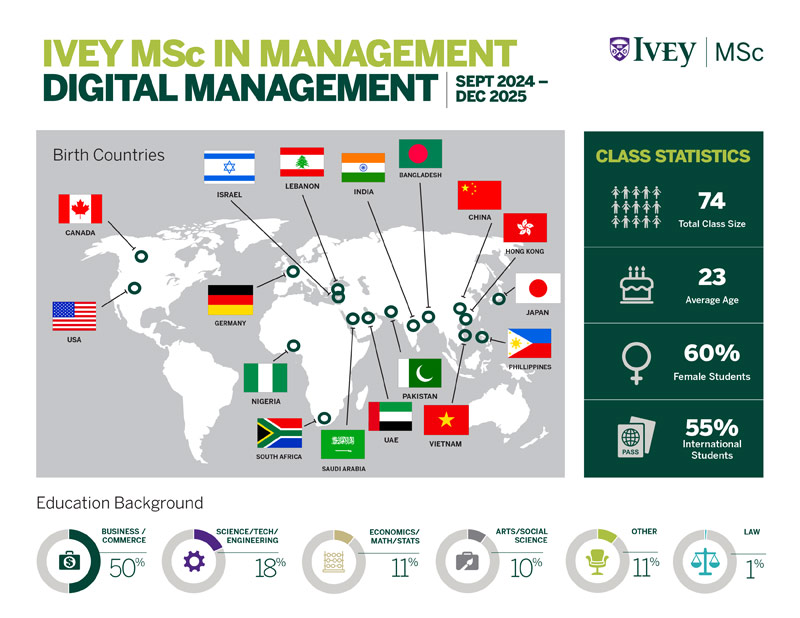In the current business environment, there is a market-driven talent gap at the intersection of technology and business management for firms and entrepreneurs.
Launch your career at the intersection of business, data, and technology with Ivey’s MSc in Digital Management. This program equips you to define real-world challenges using design thinking, assess digital capabilities, and foster innovation leveraging technologies. You’ll work directly with organizations in consulting teams to build prototype AI solutions that solve operational issues, enhance customer experiences, and increase competitiveness. Graduate with the skills employers demand and be ready to step into roles like digital strategist, innovation consultant, or transformation analyst, where your ability to turn insights into innovation sets you apart.
Year at a Glance
Strong Foundation
The core subjects of the Ivey MSc in Management are intended to strengthen your business knowledge. We’ll spend the first six months building this foundation.
Term 1- September to December
Term 2- January to April
Term 3- May to August
Term 4- September to December
Customize Your MSc in Management with Digital Badges
In partnership with Coursera, Ivey has curated content to help you build introductory tech skills in specific areas. A different set of technical content will be required each term and based on prior skill level. These badges could provide you with a distinct set of technical skills customized to your preferences and career trajectory.
- Design Software and Techniques, e.g. Web design, UX design.
- Systems Analysis and Design, e.g. LucidChart / Modelio.
- Programming for Business, e.g., R, Python, Java, or Quantum Computing Language.
- Business Applications, e.g. Salesforce, SAP, or Watson.

Highlight your Excellence with Career Management
Through a three-part series of workshops led by LinkedIn, you will develop a compelling LinkedIn profile and a portfolio of experience.
- Learn through real world examples to create, build, and foster relationships to grow your network and build your community. Most importantly, you will learn how to convert cold outreach into new connections and career opportunities.
- Receive expert advice on your profile and receive insights into optimizations and producing articles to drive traffic and engagement.
- Your training will include LinkedIn communities, events, live and commercial products including how to create a company page and run a paid marketing campaign.
Ivey MSc Graduate Diploma in Business and Sustainability
The Ivey MSc in Management Graduate Diploma in Business and Sustainability responds to seismic changes currently underway that are rapidly transforming the importance of sustainability for business. Sustainability and social responsibility now need to be at the core of an organization’s strategy and value creation model, and fully integrated across all elements of the organization and its supply chain. These changes fundamentally expand the knowledge and skills required for future leaders to succeed. The diploma focuses not only on building technical skills linked to the market demand, but also encouraging the development of broader perspectives of sustainability as a holistic systems agenda incorporating environmental, social, and economic dimensions.

